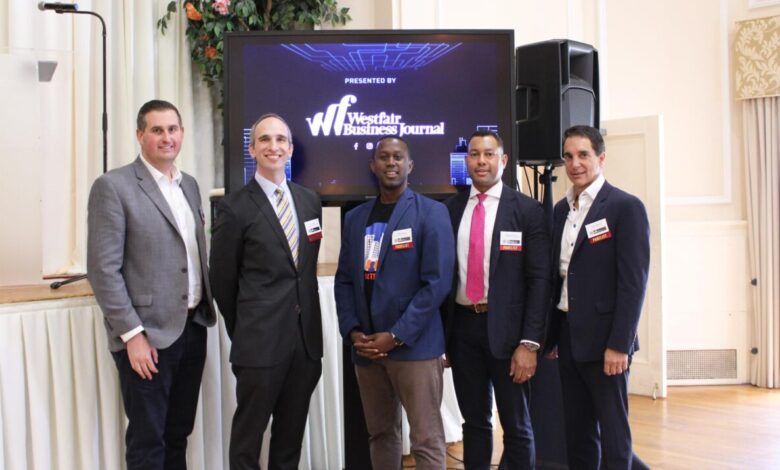Real intelligence on artificial intelligence in real estate: VIDEO

When Westfair Communications held its latest forum, “Embracing Innovation in Real Estate,” artificial intelligence (AI) was the dominant subject. The panelists acknowledged the importance of keeping up with technological advances while making it plain that it’s the human element and not technology that needs to dominate when it comes to decision making.
The panelists were: Joseph Graziose, executive vice president of development services for RXR; Vaughn Ratchford, senior vice president and chief real estate officer for the New York Blood Center; Randy Salvatore, founder and CEO of RMS Companies; and Sipho Simela, founder and CEO of Matrix Rental Solutions. The moderator was Tim Foley, CEO and executive vice president of The Building & Realty Institute.
“AI has played a huge role in our company,” Simela said. “It has allowed us to punch well above our weight class simply by being able to automate certain things.”
Simela explained that Matrix Rental had an outside company create a system for it that’s used to extract data from paperwork and verify the legitimacy of the documents through meta-data, eliminating time-consuming processes that had to be done manually, and occasionally resulted in the loss of rental income due to fraud.
“We’ve also utilized AI in the way that we do our income and we do our employment verifications, We have a process that we call ‘cross-source validation.’ Once we remove all the transactions from a bank statement we compare an account holder to the name on a driver’s license, the name on a pay stub. We’re able to run some really interesting checks around being able to validate the authenticity of documents and identity but also calculate things that take many people hours worth of time and many more staff members to do. We automate all those pieces in the process to help house more people.”
Salvatore said that when his sons joined RMS they started looking deeply into software that would help in establishing rental rates but backed off when lawsuits started to surface based on claims of price-fixing through the use of price-setting software.
Graziose said that RXR has been embracing technology while at the same time not eliminating the human element.
“We’re not going to just ‘set it and forget it.’ We’re not going to rely purely on the technology,” Graziose said. “One of the things that we’ve done at RXR over the last five years is we’ve developed our own digital lab where we have a handful of data scientists and their only job is to look at property technology and AI opportunities to see how it could enhance what we do as owners, operators and developers. We’re not going to say ‘the technology says X so we’re going to do it.’”
Graziose said that at RXR they’re evaluating the market every day. He said that the continual changes in projects and managing properties are viewed as an opportunity to put AI to work but they want to keep a human behind it so they are shadowing the technology as more of it is introduced. He said that they want to make sure that the information being ‘spit out’ to them by technology is correct, is information with which they agree and is information that is ethical.
“We want to make sure that the results that we’re setting as an organization and what we’re broadcasting as our brand and more importantly as community leaders is correct,” Graziose said.
Salvatore said that technology and AI are different things and at RMS they are embracing them both.
“Particularly in our hotels where there are a lot of tasks and organizations, whether its cleaning the rooms and figuring out what’s clean and what’s not, checking-in guests and things like that, certainly we’re embracing technology where it makes sense, and AI as an extension of that,” Salvatore said. “Where we’re really careful, both in the hotels and apartment buildings is that we’re really selling a lifestyle more than a building. We’re careful not to replace the human part of it, and really what I think we’re doing is repurposing the human element by saving time on some of the menial things. In the hotels for instance, we might have had an extra front desk agent but now because of the technology, because of the systems that person becomes a floating concierge through the lobby greeting guests and asking if they can help them.”
Salvatore said that in apartment buildings the technology hasn’t advanced to the point where a tenant can call up and have a computerized system handle whatever complaint or problem has arisen without talking to a human. He said that might change in a year or two.
“We’re looking at when that can happen and we can free up our leasing people, our management people, from dealing with the day-to-day tenant issues that can be handled as well with technology,” Salvatore said. “They become community ambassadors, planning more events for the community as a concierge in our building. We see it as not necessarily being a cost savings but a redirection of our labor to create a better lifestyle, I’ll call it, for our guests in our hotels or our apartment tenants.”
Ratchford said that the New York Blood Center is in the very early stages of exploring AI for tis various business units but has applied it to its real estate portfolio consisting of 75 assets in 15 states. He said that when trying to find locations for blood donation centers they rely heavily on evaluating data that discloses whether there will be sufficient blood donors in the area.
“This is all data that we take a very long look at when we’re deciding whether or not a space is suitable for leasing or purchasing,” Ratchford said. “It’s truly understanding the data and where that leads us.”
Ratchford said that the Blood Center needs to store and manage a lot of data including information about donors as well as various blood products and their distribution to hospitals.
“When you think about where we’re actually doing the testing, processing and distribution, proximity to the hospitals is one of the most critical factors in trying to select a site,” Ratchford said. “Having space where we’re able to stage our mobile drives, deploy our vehicles and equipment and also be able to get what we’ve collected back to our headquarters, all of those factors come into play as we’re selecting sites.”
The Westfair Business Journal event took place at the C.V. Rich Mansion in White Plains.
Silver Sponsors were The Cappelli Organization and RMS Companies.
Bronze Sponsors were: BRI, The Building & Realty Institute; Cuddy + Feder LLP; Consigli Construction Company Inc.; DelBello Donnellan Weingarten Wise & Wiederkehr LLP; Fordham Real Estate Institute; GDC Ginsburg Development Companies; Turner.
Supporters were: M&T Bank; Action Entertainment; Sharc Creative; Spinnaker Real Estate Partners LLC, Rakow Commercial Realty Group and Langan Engineering.



